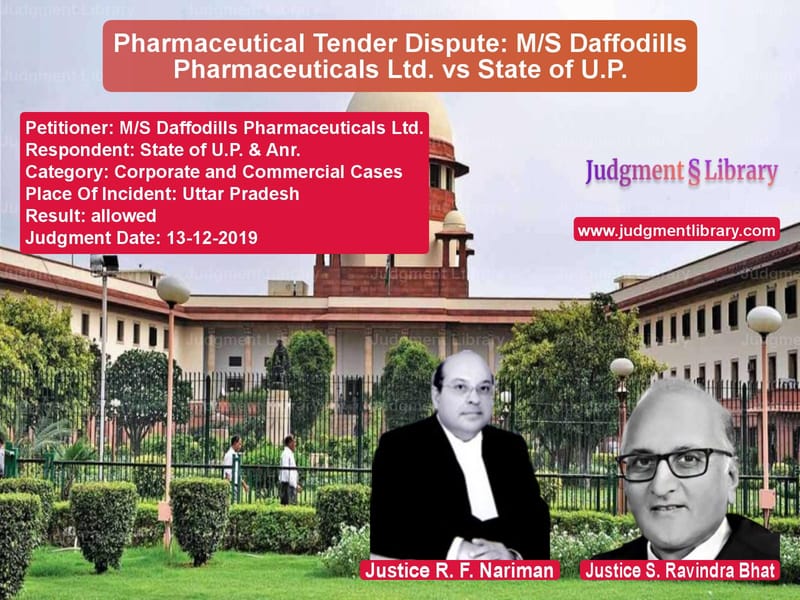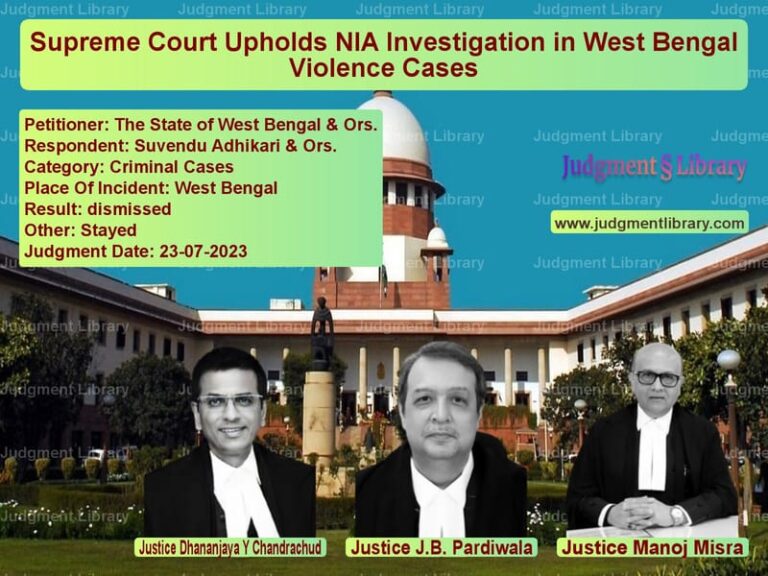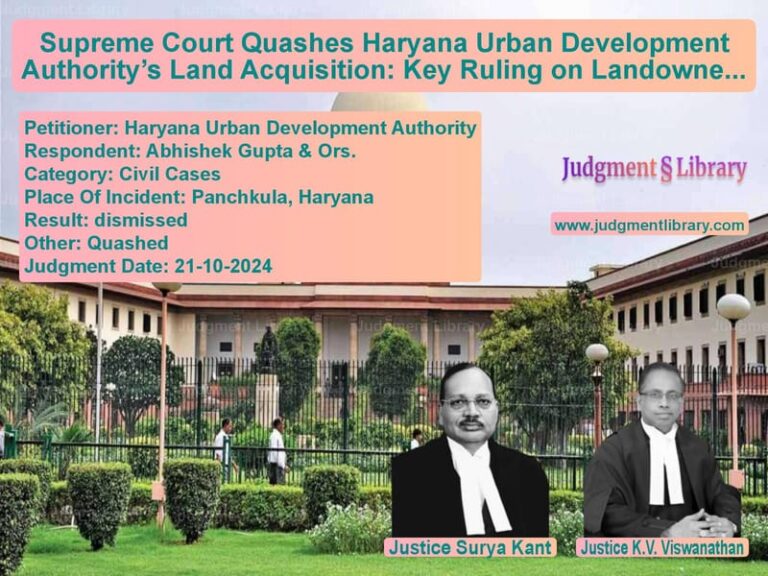Pharmaceutical Tender Dispute: M/S Daffodills Pharmaceuticals Ltd. vs State of U.P.
This case concerns M/S Daffodills Pharmaceuticals Ltd., which filed an appeal against the rejection of its tender for supplying medicines to the Health Department of the State of Uttar Pradesh. The appellant contended that the decision to exclude them from the procurement process was based on mistaken assumptions, including that a criminal case was pending against them, when in fact, it was an individual (Surender Chaudhary) who had resigned as Director in 2012. The case highlights issues of procedural fairness and the principles of natural justice in public procurement decisions.
Key Facts of the Case:
- The appellant, Daffodills Pharmaceuticals, participated in a tender process issued by the State of U.P. for the supply of medicines under the Medical and Health Department.
- After winning the bid, Daffodills was informed by the U.P. Government that an FIR had been filed against the company, alleging criminal activities related to procurement orders, and that the company was under investigation by the CBI.
- On the basis of this FIR, the Principal Secretary of the U.P. Government issued a directive to halt local procurement from Daffodills, citing the ongoing investigation, which the appellant contested.
- Daffodills argued that the FIR concerned an individual (Surender Chaudhary), who had resigned as the company’s director in 2012, and the action taken against the company was unfair and arbitrary.
- The Allahabad High Court upheld the U.P. Government’s decision, leading to the present appeal in the Supreme Court.
Petitioner and Respondent Arguments:
Petitioner (Daffodills Pharmaceuticals Ltd.): The petitioners argued that the decision to stop procurement from Daffodills was based on the mistaken assumption that the company was under investigation, which they claimed was a misunderstanding. They further contended that they were not given a fair opportunity to be heard before the government passed its decision, and that the action amounted to blacklisting without due process.
Respondent (State of U.P.): The respondents defended their decision, arguing that the involvement of Surender Chaudhary, a former director of the company, in the FIR justified the action taken against the company. They contended that the directive was not a blacklisting order, but merely a temporary measure pending investigation, and did not violate any principles of natural justice.
Important Judge Arguments:
Justice R. F. Nariman: Justice Nariman emphasized the importance of procedural fairness in government procurement decisions. He stated that while the U.P. Government’s decision was based on the involvement of Surender Chaudhary, it was unreasonable to penalize the company for the actions of a former director. He also noted that the appellant was not given an opportunity to be heard before the decision was made, which violated principles of natural justice.
Justice S. Ravindra Bhat: Justice Bhat concurred with Justice Nariman’s view, underscoring the need for transparency and fairness in the procurement process. He criticized the U.P. Government’s failure to provide a hearing and found the action of barring procurement from the appellant to be disproportionate, especially since it was based on an erroneous assumption.
Legal Provisions Discussed:
- Article 14 of the Constitution: The petitioners argued that the government’s decision violated their right to equality before the law, as the decision was made without a fair hearing or due process.
- Raghunath Thakur v. State of Bihar (1989): The Court cited this case, which established that any decision to blacklist or debarring an entity must be preceded by a fair hearing and a reasoned order, ensuring the principles of natural justice are upheld.
- Erusian Equipments and Chemicals Ltd. v. State of West Bengal (1975): The Court referred to this case to emphasize that unilateral action by the state against a contractor, especially without a hearing, is arbitrary and illegal.
Final Judgment:
The Supreme Court allowed the appeal, setting aside the decision of the U.P. Government to stop procurement from Daffodills Pharmaceuticals. The Court held that the appellant had been deprived of the opportunity to present its case before the government’s decision was made, and that the action taken was unreasonable. The Court quashed the directive issued by the U.P. Government and emphasized the need for fairness and due process in public procurement decisions.
Conclusion:
This case highlights the importance of ensuring fairness and transparency in government procurement processes, particularly when decisions affect business entities. The judgment reinforces the need for compliance with the principles of natural justice, including the right to be heard before adverse actions are taken. The Court’s decision to quash the U.P. Government’s directive underscores the importance of procedural fairness and the protection of businesses from arbitrary state actions.
Petitioner Name: M/S Daffodills Pharmaceuticals Ltd..Respondent Name: State of U.P. & Anr..Judgment By: Justice R. F. Nariman, Justice S. Ravindra Bhat.Place Of Incident: Uttar Pradesh.Judgment Date: 13-12-2019.
Don’t miss out on the full details! Download the complete judgment in PDF format below and gain valuable insights instantly!
Download Judgment: MS Daffodills Pharm vs State of U.P. & Anr. Supreme Court of India Judgment Dated 13-12-2019.pdf
Direct Downlaod Judgment: Direct downlaod this Judgment
See all petitions in unfair trade practices
See all petitions in Company Law
See all petitions in Corporate Governance
See all petitions in Judgment by Rohinton Fali Nariman
See all petitions in Judgment by S Ravindra Bhat
See all petitions in allowed
See all petitions in supreme court of India judgments December 2019
See all petitions in 2019 judgments
See all posts in Corporate and Commercial Cases Category
See all allowed petitions in Corporate and Commercial Cases Category
See all Dismissed petitions in Corporate and Commercial Cases Category
See all partially allowed petitions in Corporate and Commercial Cases Category







